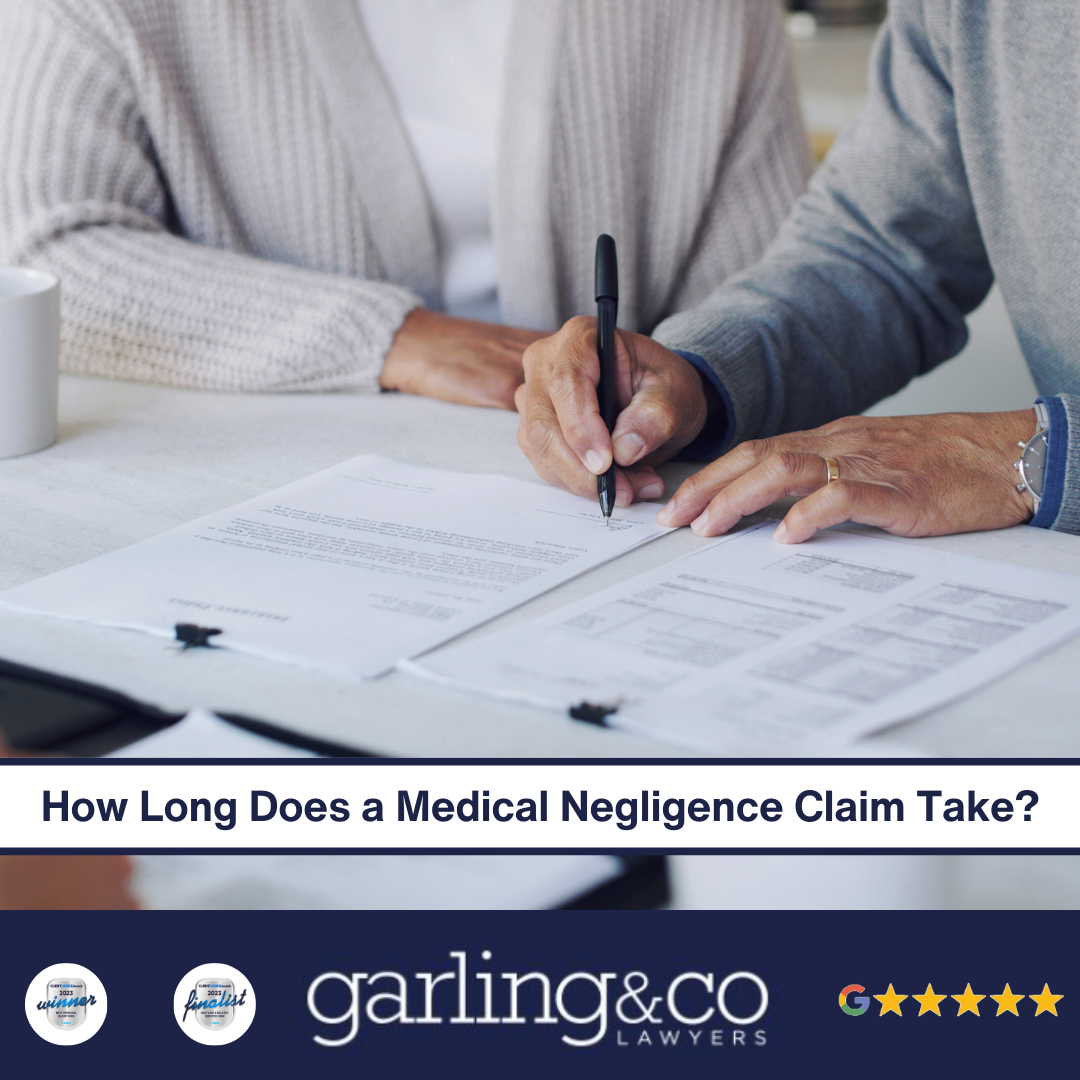
In most cases it is also in the best interest of the defendant to avoid going to court. For more information on why, read our article on benefits and pitfalls of mediation in medical negligence.
The matter can then be commenced in Court and usually takes a further 6 to 12 months to resolve.
If agreement can be reached without the need to go to Court, then the claim will resolve quicker than if the defendant denies negligence and the matter needs to be heard before a Judge.
Medical negligence claims usually take somewhere between 2 to 3.5 years to resolve.
Why can medical negligence cases take so long to resolve?
Medical Negligence cases take a long time to resolve because they usually involve complex medical and legal arguments. It is common that your lawyer will need to obtain an expert medical opinion in relation to what the doctor or hospital has done wrong, which has caused your injuries.
This involves finding, briefing, and obtaining a report from a medical professional that outlines why the doctor or hospital was negligent. To obtain this opinion your condition needs to be stable, that is have reached maximum medical improvement and is unlikely to change in the future. Your lawyer will also need to obtain a copy of all your clinical records and notes from all doctors you have seen since your injury. It takes some time for your condition to stabilise and then additional time for a lawyer to obtain all the relevant notes from your doctors.
Once the evidence, both factual and medical, has been obtained in your matter the defendant is also allowed to obtain its own evidence in reply. This will include having you medically examined and obtaining their own expert reports in response to your claim. Once the defendant has had a chance to obtain its own evidence then a settlement conference is usually arranged to see if the matter can be resolved and if that is unsuccessful then is then listed for hearing in the Supreme Court of NSW.
Once you apply for hearing in the Supreme Court it usually takes about 1 year to obtain a hearing date.
What do I need to prove to be successful in my medical negligence claim?
Medical professionals such as doctors, nurses, and hospitals, owe you a duty of care to ensure as best they can that they do not injure you whilst providing you with treatment. To be successful in a medical negligence claim you must be able to prove that a medical professional has breached that duty of care.
A duty of care is breached when someone is injured because of the action (or in some cases, lack of action) of another person when it was reasonably foreseeable that the action could cause injury and a reasonable person in the same position would not have acted that way.
You, therefore, need to prove what action or lack of action, the medical practitioner did or did not take that caused your injury.
This will involve examining in detail, either the procedure that went wrong or some other failure of the medical professional such as a failure to diagnose your condition. Such an examination will involve the following;
- Obtaining all your medical records from the medical profession or any other medical professional.
- Taking a detailed statement from you in relation to your injury and its effects upon you.
- Obtaining expert medical opinion to show how the medical professional breached their duty of care.
- Obtain medical and other expert opinion in relation to any damage or any injury that was sustained by you because of that breach of duty of care.
- If economic loss is claimed, your lawyer needs to have access to your tax returns for at least 3 years prior to the date of your claim, as well as pay slips and bank statements to show your loss of income.
- A copy of all accounts/receipts in relation to any expenses you have incurred because of the breach of duty of care.
Once those documents have been obtained your lawyer will then be able to give you more specific advice as to whether or not your claim is likely to be successful and the value of your claim for damages.
How are medical negligence claims settled?
When commencing a medical negligence claim, most plaintiff’s do not wish to go to Court due to the requirement to give evidence, the cost, the stress, the possibility of a long drawn out hearing, or the time it takes to get a judgement.
If you are a medical negligence plaintiff who does not want to go to Court rest assured there are a number of opportunities throughout your claim to try and resolve the matter, including but not limited to; offers of settlement, informal settlement conferences, and mediation.
What are offers of settlement?
It is not uncommon for offers of settlement to be exchanged in the early stages of a claim. However, these early offers are usually at the lower end of compensation that you should receive. This is because at such an early stage the parties are not aware of the full extent of the injurie(s) sustained or the strengths and weaknesses of each parties case.
For this reason, all offers should be considered with your lawyer prior to acceptance. Often your lawyer will be able to get you 10 – 15 times more compensation than the defendant’s initial offer of settlement.
What is an informal settlement conference (ISC)?
Depending on the value and complexity of your medical negligence / medical malpractice claim, your lawyer may suggest an ISC which is an informal form of alternative dispute resolution.
An ISC is arranged and undertaken by both parties. Usually, the plaintiff and their legal representative, the insurer, and the defendant solicitor partake in the ISC.
At the conference parties will sit in separate rooms and offers of settlement will be communicated backward and forward between the parties. If an offer is reached that both parties are satisfied with then the matter will be settled at the ISC.
If parties cannot reach an agreement the parties will likely go to mediation, or if the matter has not already been commenced in court, the plaintiff’s solicitor will have to file the Statement of Claim in court and commence proceedings.
If your claim is in the Supreme Court jurisdiction and is very complex, or if there are great disparities between the plaintiff’s and the defendant’s medical or liability evidence your lawyer will likely instruct you to attend mediation instead of attempting an ISC.
What is mediation?
Mediation is an alternative dispute resolution process involving an independent impartial mediator who assists parties in settling their legal disputes outside court.
At the mediation, the plaintiff and their legal team will be in one room, and the defendant and their legal team will be in another room.
At the commencement of mediation, the mediator will bring parties together to undertake opening submissions. Depending on the nature of the case, the submissions may be between legal counsel only.
Once submissions have concluded and each party have articulated their issues, the parties will go back to their breakaway rooms and begin the negotiations.
Once negotiations have commenced, the mediator will travel between rooms conveying offers to each party. Anything that is discussed with the mediator in the breakaway room is confidential.
If your matter does not settle at mediation the defendant may continue to make offers after mediation in the lead up to hearing.
When will my case go to court?
If you have failed to resolve your case outside of court and you have exhausted all alternative dispute resolution avenues your matter will be listed for a hearing date.
In our experience 98% of matters settle outside of court. Some even settle on the morning of the first day of the hearing!
If you want to know more about resolving your medical negligence claim, contact Garling & Co Lawyers for a free case assessment.












